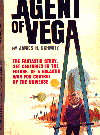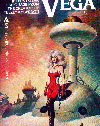James H. Schmitz
James H. Schmitz was the author of a number of science fiction fantasy novels and stories. After his death, his out-of-print works retained an enthusiastic following and were republished in the 1980's. They are remarkable for their bold female characters (surprising even by today's standards), and also for the author's deft handling of psionics. Many of Schmitz' writings fall into one of two universes and have many interlocking characters. He wrote one set of tales set in the universe of the "Agent of Vega" series. He created a different universe in the "Federation of the Hub" series which includes over two dozen stories and novels. His writings exist as eight novels and fifty-odd stories in several collections, most of which were published between 1960 and 1974.
List of works
Agent of Vega (1960)
Agent of Vega is a book consisting of four long stories that were originally published 1949-51 in Astounding Science Fiction Magazine. Several editions of the book were subsequently published.
The four stories in the book are Agent of Vega, The Illusionists, The Truth about Cushgar, and The Second Night of Summer.
The first three stories center around Iliff, a seasoned Zone Agent who is an expert trouble-shooter in the employ of the powerful but over-extended Psychology Service. His assignments are doled out by the Third Coordinator, a highly competent boss whom Iliff loves to despise. The Third Coordinator sends Pagadan, a representative of a new species, to apprentice with Iliff. And when she arrives, Iliff finds himself trailing after his old nemesis, U-1. Iliff is extremely well-balanced mentally about everything except U-1, who once defeated him and left him for dead. The Third Coordinator has evaluated, and uses, Iliff's sensitivity about this humiliation. Iliff knows how he is being manipulated and hates it, but he hates U-1 enough to endure it.
Zone Agent Iliff's disgruntled cynicism, and the razor-sharp dialogue between him and his boss, the Third Coordinator, make this a very fun read. The situations which the Zone Agents investigate are also quite intriguing. These are "good" psi cops chasing "very bad" runaway psi's who are menacing those around them and could only be stopped by other psi's. The bad gize have to get very bad indeed before the Psychology Service gets motivated to send someone after them. As usual, Schmitz' plots become very creative yet stay within rational boundaries.
The first three stories are considered very good, and the last one a little less so. The last one deals with a different Zone Agent who is not quite as captivating as Iliff.
A Tale of 2 Clocks (1962)
A Tale of 2 Clocks wis a Trigger Argee adventure, and touches on Quillan, Pilch, plasmoids, and Old Galactics. Trigger is one of two recurring female lead characters for Schmitz. Like Telzey, she is privileged and extremely capable, but unlike Telzey, she has little or no psionic ability. Instead, she is equipped with above average intelligence, training, and a dollop of creativity.
Several of Schmitz' strengths as a writer come out in this yarn. Human perception gets questioned, as the alleged culprits turn out to have a very unexpected nature and motivation. Qualities of "good" and "bad" are played with ironically. Pilch is one example: powerful and unrelenting enough to take on a forbidding mien to Trigger and others, but Schmitz makes clear that she is basically benign. She also appears in other works, as does the resourceful free-lance, semi-criminal detective, Quillan.
This story does not move as quickly as some other works, but is nevertheless a thought-provoking and satisfying read.


